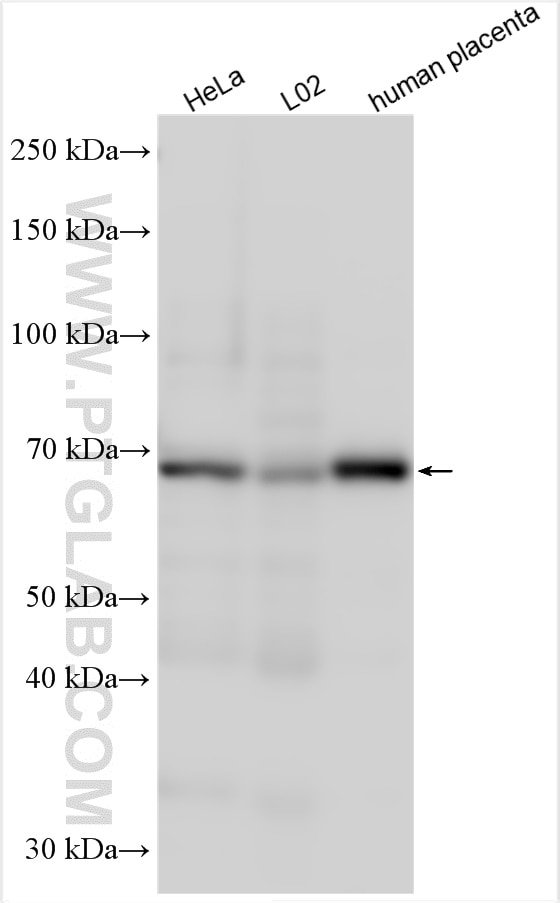Validation Data Gallery
Tested Applications
| Positive WB detected in | HeLa cells, L02 cells, human placenta tissue |
Recommended dilution
| Application | Dilution |
|---|---|
| Western Blot (WB) | WB : 1:500-1:1000 |
| It is recommended that this reagent should be titrated in each testing system to obtain optimal results. | |
| Sample-dependent, Check data in validation data gallery. | |
Published Applications
| WB | See 1 publications below |
| IHC | See 1 publications below |
Product Information
22815-1-AP targets SLCO1B3/OATP1B3 in WB, IHC, ELISA applications and shows reactivity with human samples.
| Tested Reactivity | human |
| Cited Reactivity | human |
| Host / Isotype | Rabbit / IgG |
| Class | Polyclonal |
| Type | Antibody |
| Immunogen |
CatNo: Ag18940 Product name: Recombinant human SLCO1B3 protein Source: e coli.-derived, PGEX-4T Tag: GST Domain: 11-48 aa of BC105597 Sequence: AESASSEKKKTRRCNGFKMFLAALSFSYIAKALGGIIM 相同性解析による交差性が予測される生物種 |
| Full Name | solute carrier organic anion transporter family, member 1B3 |
| Calculated molecular weight | 702 aa, 77 kDa |
| Observed molecular weight | 70-75 kDa |
| GenBank accession number | BC105597 |
| Gene Symbol | SLCO1B3 |
| Gene ID (NCBI) | 28234 |
| RRID | AB_3669405 |
| Conjugate | Unconjugated |
| Form | |
| Form | Liquid |
| Purification Method | Antigen affinity purification |
| UNIPROT ID | Q9NPD5 |
| Storage Buffer | PBS with 0.02% sodium azide and 50% glycerol{{ptg:BufferTemp}}7.3 |
| Storage Conditions | Store at -20°C. Stable for one year after shipment. Aliquoting is unnecessary for -20oC storage. |
Background Information
SLCO1B3, also known as OATP8 or OATP1B3, is a member of Organic Anion Transporting Polypeptides (OATPs) which are sodium-independent organic anion transporters mediating the uptake of a wide range of structurally diverse endogenous and exogenous compounds including bile acids, hormone conjugates, peptides, toxins, as well as a multitude of therapeutic drugs. SLCO1B3 is specifically expressed in liver under normal condition, while its expression has also been observed in cancer tissues like colon, prostate and pancreas. SLCO1B3 is a glycosylated protein and can be detected in the non-glycosylated form at 70-75 kDa(PMID: 21278621).
Protocols
| Product Specific Protocols | |
|---|---|
| WB protocol for SLCO1B3/OATP1B3 antibody 22815-1-AP | Download protocol |
| Standard Protocols | |
|---|---|
| Click here to view our Standard Protocols |

